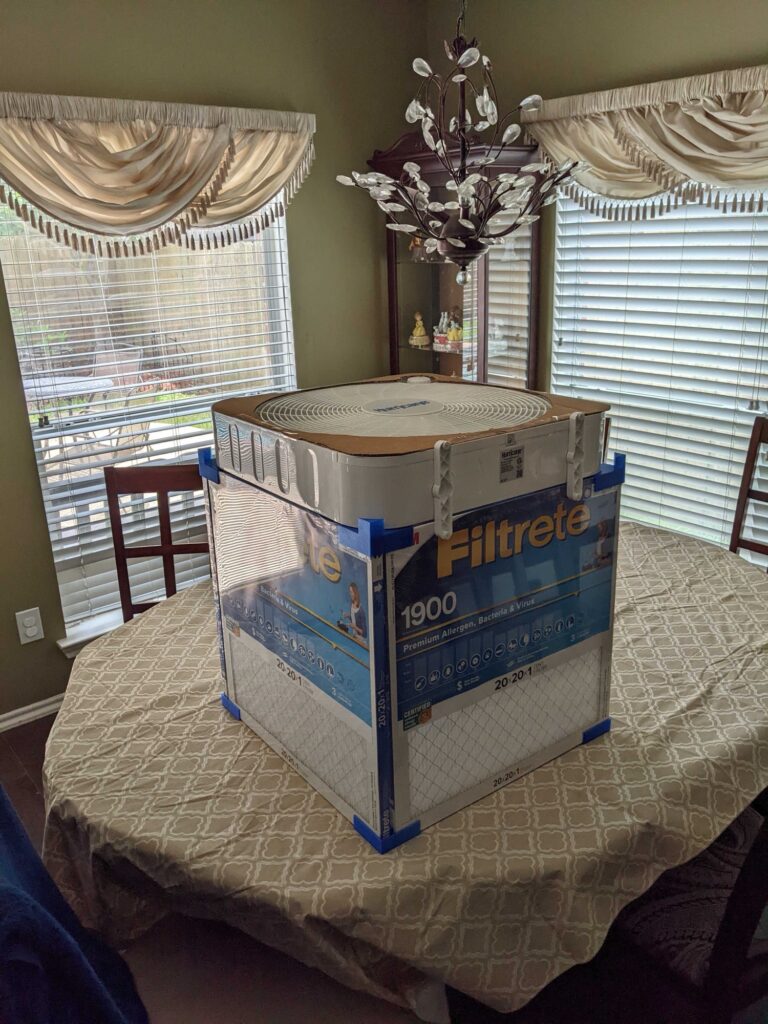
I’ve gone through a few wildfire smoke events in my life. The valley I live in doesn’t experience wildfire but we do get the smoke, and it can last for days or weeks on end. Plus our homes are filled with pollen, pet dander, viruses, bacteria, mold, and microplastics. Indoor air quality can be substantially worse for health than outdoor air, and particulate matter can cause heart problems, respiratory issues, and more.
For years I’ve relied on good HEPA filtration to keep these particles out of my lungs, and though they do work, if you’ve ever owned one you’re likely familiar with some of their quirks. They’re loud, break quickly, and can be costly to operate especially in California where power rates peak at 55¢ per kwh!
They also use proprietary filters, models and brands come and go, and most end up being tossed out within 3-5 years for one reason or another.
Alternatives to HEPA filters
DIY air filters constructed from MERV 13+ HVAC filters are less efficient at cleaning air in a single pass, but they move so much more air that they can filter particles just as well as most HEPA filters can on full speed but at half the volume and 1/8th of the electricity usage. That’s because they recycle the air in the room faster and because they’re quieter at full speed and barely use any energy, you can let them run at that speed all day.
The air filter I currently use burns 64 watts at 100% speed, where something like the NuKit Tempest, a PC fan based design uses a mere 9w. I have 3 air filters, which would use 192 watts when running full speed – and that is the speed I need to run them at to reach the Clean Air Delivery Rate on the box; except that doing so would make it difficult to have a conversation or fall asleep.
Running 3 of these at full speed would cost about $700 a year.
If I replaced my current air filters with power sipping PC fan based air filters, it would drop the electricity usage from $700 per year to about $135 per year.
Then there is the filter cost. The HEPA filters clog up rather quickly, but most machines recommend changing them at least once a year. A name brand Hepa filter probably costs $35-$50 – so for three machines $105-$150 per year. Most of the pc fan based air cleaners I’ve seen use 2-4 HVAC filters, which run $12-$17 each, but because of their large size and higher efficiency should last 12-18 months. Replacing them annually would cost between $72 and $204 annually depending on the number of filters used in your machines and the cost of the filters chose .
Since I don’t run them at that speed and usually opt for speed 2, which pulls over 40 watts, I would save about $440 dollars per year in power usage.
Another coat consideration is that most fans bearings fail after several thousand hours, that means after 2-5 years of constant 24/7 usage the fan has to be replaced. With a HEPA filter – that means replacing the entire unit, but for a DIY Corsi-Rosenthal box built with PC fans, you simply replace the failed fan
Using PC fans also opens up some other possibilities like using a USB power pack to power the air cleaner. That allows a small one to become portable, and to run one during power outages.
A portable air filter can even be used in public spaces and it will create some benefit if a person is worried about Covid and other viruses – as long as you remain close to the filter – I think. This is overkill but I might not think so if I catch covid again.
The primary downside to this style of air cleaning is the DIY nature of them- meaning the assembling of them and the lack of modern design capability. Most are made from laser cut plywood, and in some cases are just plastic sheeting, air filters, and duct tape.
I prefer the ones from Clean Air Kits, and their Tower of Power kit, which is powerful enough to clean large rooms like my living room and office area. I will eventually pick one of these up to replace a failing HEPA filter.